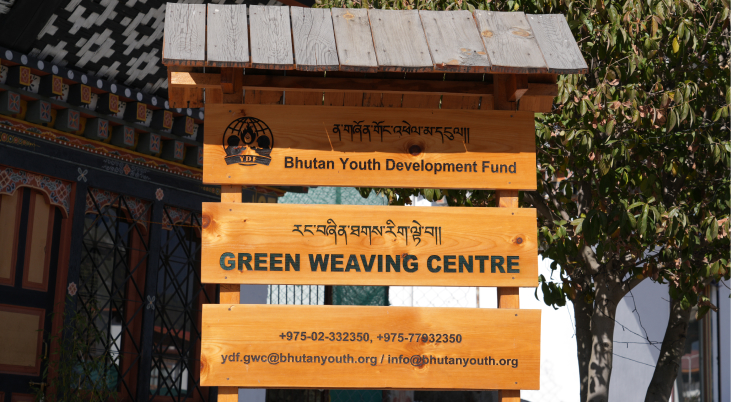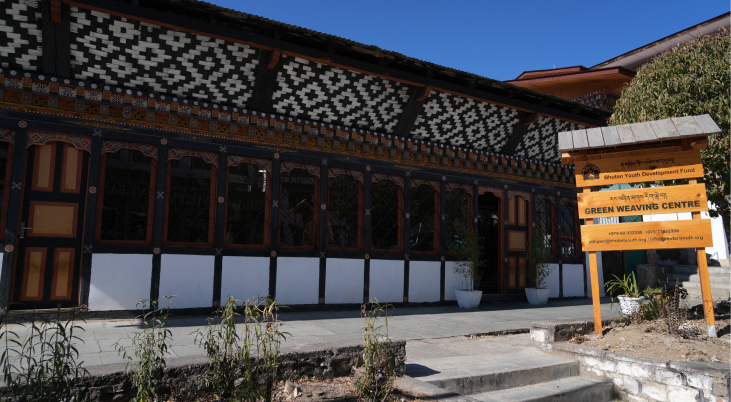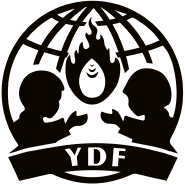

Bhutan’s youth face evolving socio-economic realities, with traditional job markets struggling to accommodate an ever-growing number of graduates. While the principles of Gross National Happiness (GNH) offer a holistic framework for development, youth unemployment and the need for sustainable livelihood options remain pressing. At the same time, environmental challenges—such as rising waste levels—create an urgent demand for innovative solutions that balance social well-being, environmental protection, and economic viability. YDF’s response to these challenges and opportunities is driven the 3P ethos: people, planet, and prosperity.
Young people often lack access to the capital, mentorship, and networks needed to launch or scale up their business ideas.
While social enterprises are growing, many remain small-scale due to limited resources, fragmented support systems, and gaps in policy.
Bhutan’s commitment to being carbon-negative and preserving its cultural heritage requires business models that prioritize sustainability and community impact.
There is a significant opportunity for people-, planet-, and prosperity-focused ventures that generate income while strengthening Bhutan’s social fabric and environmental stewardship.
Since its first venture—recycling waste paper into pulp egg trays in 2013—YDF has steadily expanded its portfolio of social enterprises to address youth unemployment and environmental challenges. Each enterprise is powered by the three P-ethos of people, planet, and prosperity, aiming to:
Promote Youth Entrepreneurship: Offer skill development, mentorship, and hands-on work opportunities that nurture future business leaders.
Support GNH & SDGs: Align ventures with Bhutan’s Gross National Happiness vision and the global Sustainable Development Goals.
Reinvest Profits in Youth: Fund additional YDF programs that uplift young people, protect the environment, and foster a learning culture among employees and stakeholders.
A five-day intensive workshop on design thinking, social entrepreneurship, and pitching for seed funding.
A four-week foundational course covering business, human, and technology skills, followed by potential startup funding.
An online mentoring platform linking entrepreneurs with experts in marketing, finance, and scaling.
A co-working space that offers affordable offices, meeting rooms, and event venues for collaboration.
A seed-and-scaling investment program providing Nu. 100,000–200,000 for promising ventures.
A monthly networking series where participants connect, learn, and share innovative ideas in an interactive fireside-chat format.
With a goal to empower 1,000 young people and incubate 100 impact-focused businesses by 2030, Innovate Bhutan, a YDF social enterprise, has already trained 443 youth and provided seed funding to 24 social enterprises.
Vision: To be Bhutan’s leading institute for fostering social and environmental enterprise innovation—enhancing the nation’s economy and forging transformative change both nationally and globally.
Mission: Empower and build a robust ecosystem of “inno-preneurs” by providing education, incubation, and capacity development—bridging academia, industry, and grassroots initiatives.
Blending tradition with environmental stewardship, the Green Weaving Centre preserves Bhutanese hand weaving and natural dyeing techniques while promoting economic empowerment. More than 108 skilled weavers across six districts create eco-textiles, many of which bear the Royal Government of Bhutan’s “Seal of Quality.” By championing the motto “Greener Mind, Greener Weave, Greener Economy,” this initiative supports local artisans, keeps cultural heritage alive, and reduces the environmental impact of textile production.



Building on the successes of YDF’s Waste Paper Recycling Unit (WPRU), GreenPapers is a scalable, nature-positive social enterprise targeting both youth unemployment and environmental pollution. By upcycling waste paper and cardboards into pulp egg trays and other market-ready products, it will supply local poultry farms with stable, affordable trays while creating green jobs for youth and women.
Environmental Impact: Aims to conserve 35,000 trees, avoid 2,300 tonnes of greenhouse gas emissions, and protect local biodiversity by 2034.
Economic Empowerment: Plans to process 1,225 metric tons of waste paper, employing 20+ individuals (directly and indirectly), and reinvesting 50% of profits into youth/women-led startups via a Youth Impact Venture Fund.
Funding & Timeline: With an estimated project cost of Nu. 24.54 million, GreenPapers is slated for completion by January 2025 and official launch in 2025 at Baychu, Wangdue Phodrang.
Waste Paper Recycling Unit (WPRU), Bjemina
The pioneering YDF enterprise that recycles waste paper into egg trays, reducing landfill waste and creating job opportunities.
Nazhoen Pelri Hub, Gelephu
A multi-purpose recreational and community space fostering youth engagement and skill-building activities.
YDF’s holistic entrepreneurship strategy combines innovation, environmental sustainability, and community impact—providing Bhutanese youth with the tools, networks, and resources they need to drive social change. By scaling proven ventures like WPRU into GreenPapers, nurturing a vibrant entrepreneurial culture through Innovate Bhutan, and continually evolving other social enterprises, YDF envisions a future where every business in Bhutan is a catalyst for socio-economic and environmental transformation.

Copyright © 2025 Bhutan Youth Development Fund.
Post Box 255 | Thimphu, Bhutan | tel: +975 2 327483 | fax: +975 2 326730 | info@bhutanyouth.org